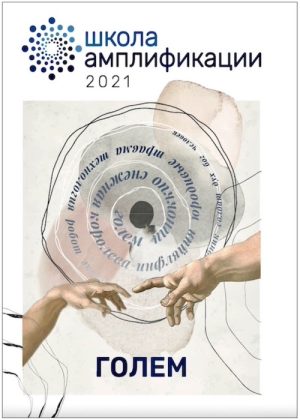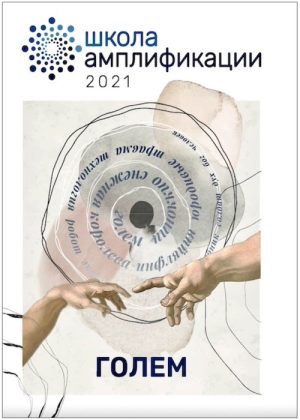My Store
Amplification School 2021 - Golem
Amplification School 2021 - Golem
Couldn't load pickup availability
School of Amplification - Golem. Conference Proceedings 2021.
FROM THE EDITORS
Elena Purtova on the "Amplification School" project
The "Amplification School" project is the result of the coronavirus and self-isolation. We are a group of like-minded individuals who revived the MAAP offsite conference format in 2019, but in 2020 were forced to move the conference online. We strived to preserve the best of the format we had created, and careful technical design of the conference architecture minimized the inevitable organizational noise, resulting in a rich and convenient conference. Our personal pleasure in being free of organizational issues and comfortably immersing ourselves in the content of the presentations and workshops inspired us to seek new online formats that could leverage the best of online opportunities and infuse our professional lives with new colors. I think everyone remembers how many new and unexpected projects have emerged online during this time; our "Amplification School" is one of them. We hoped that the conference would become a regular project and, since it coincided with the beginning of the astrological year in March, would fit into the professional community's conference rhythm. What was the idea behind this project? We wanted not only to listen to the presentations but also to have a space to discuss them "among ourselves"—in a group without overlap. We remembered well how we learned in our training and how much value we gained from the discussions in our supervision groups—from colleagues, not from supervisors. Completing the training, we were left with a need for such a professional group in which we could continue to grow and develop our analytical thinking. Discussing the texts and retelling the presentations is an important part of understanding the conference content; sometimes more discoveries occur in behind-the-scenes conversations with colleagues than in silently listening to the presentations on stage. We wanted to create a space that would encourage the active digestion and development of the speakers' ideas, one that would be not an auxiliary, but a primary means of generating new meanings. Therefore, the conference structure was as follows: a presentation via Zoom, a discussion of the presentation in small groups (students, graduates of basic analytical psychology programs, candidates, and members of the international association), and then a general discussion with the presenter. Each of the two conference days began with a warm-up dream matrix and ended with a reflective small group with the same participants. Another important dimension of the project was the content of the discussions. We needed to immerse ourselves in the content of the presentations through the personal meanings of the participants, to be able to combine the emotionally moving and the conceptual in the discussion, to utilize cultural associations and rely on them in understanding individuation. In other words, we wanted to create a space not for intellectual ideas, which often shield listeners from the impact of the material, but for living associations and amplifications that would allow the material to be experienced as transformative. Therefore, each group worked with a moderator, whose task was to maintain an environment safe for associations and amplifications. We called this structure the "School of Amplification" because we all learn through discussion; we are all students of this school. The third unique feature of this project is its format. Online learning gave us the opportunity to discuss analytical psychology with our compatriots living in different countries, and we wanted to maintain this unique opportunity regardless of the pandemic. Many of the participants are graduates of IAAP's distance learning programs and need to maintain connections with the community, just as we need to hear from them and learn about their experiences developing analytical psychology in a wide variety of cultural contexts. Meeting Russian-speaking professional colleagues from other countries was also a great joy for us. Apart from the Israeli schools for Russian-speaking IAAP candidates, which have been suspended during this period, we have no other opportunity to meet and discuss professionally important topics.
A total of 100 people from 15 countries (Russia, Austria, Azerbaijan, Belarus, Israel, Spain, Kazakhstan, Canada, Cyprus, Latvia, the Netherlands, Slovenia, the USA, Ukraine, and Switzerland) and 12 Russian cities (Moscow, Vladivostok, Voronezh, Goryachiy Klyuch, Domodedovo, Krasnodar, Nizhny Novgorod, Novosibirsk, Perm, Podolsk, St. Petersburg, and Saratov) participated in the "Amplification School." Where else could we have met in such a large group—especially not for silent presence in Zoom windows, but for active dialogue? Since this was our first experience with a conference of this kind, we recorded the work of small and large groups to further reflect on the project's structure and organization. Even now, after listening to the recordings and preparing for the second "School of Amplification" conference, many thoughts remain about how to structure the process so that there's enough space for both personal reflection and generalization, so that we can share our thoughts with other groups and hear feedback from the speaker. The value of the recordings extends beyond solving organizational problems. The materials from the group discussions themselves became an important part of the conference, as we had originally intended. We were able to learn from each other, and we want to document this experience in writing. Not only the school's papers, but also the discussions themselves deserve publication and deserve rereading with attention to personal resonances and reflections.
I thank the group moderators who carefully maintained the conference field and were able to act as midwives for the birth of new meanings.
Olga Kondratova on amplification
I'd like to say a few words about the concept of "amplification." It denotes "expansion," perhaps an awareness of the meanings and implications of a symbol, which can be represented by dreams, symptoms, and other manifestations of the language of the unconscious. By amplification, we usually mean so-called cultural associations—a film, a fairy tale, a book, and so on—a plot in which one can wander, discover something, and return enriched to the original. Jungians are often accused of straying further and further from the original symbol, eventually forgetting it. One of the goals of the school is to train the ability to amplify without losing sight of the primary symbol. The central, original symbol of the first school was the concept of the "golem," from which the following was born: "Inflation: Between the Divine and the Human." How did this happen? In searching for a name, we drew on the myth of the magicians who decided to create golems, just as God created man, arrogantly believing they could. But this is also contained in the parable—which, thanks to Bernard Sartorius, became central to our school—of the rabbi who created the Golem and forgot to erase the letter on its forehead, thereby suppressing part of God's teaching. Thus, the creation of any golem/Golem involves a desire—conscious or not—for its creator to compete with the Creator, and this is the inflation of the ego, which attempts to inflate itself to the limits of the Self, which is fundamentally impossible. And this process perfectly illustrates the very process of the Golem's growth when its letter was not erased. James Hillman offers a somewhat different understanding of the concept of "amplification" in his book "Archetypal Psychology." He says that amplification is a method of organizing/shaping context with the goal of approaching from various angles a state where meaning becomes as complete and rich as possible. Hillman illustrates the idea of amplification by how a depth psychologist gets to know their client through inquiry, anamnesis, dreams, relationships, the current moment of experience, genogram, personal and family mythology, and so on. Only by engaging with all of this can one "make a deep diagnosis." From this perspective, our entire first school was an amplification of the "Golem/Golem" image, which about 100 people worked on for two days. And our collection is an attempt to generalize, to see the result as fully as possible.
Thank you for your cooperation, for permission to make recordings, for the very possibility of creating this beautiful amplification of the image of the Golem and, through it, exploring one of the most complex concepts of analytical psychology - inflation.
SHA organizers: Liya Kinyevskaya, Olga Kondratova, Natalya Pavlikova, Elena Khandurova, Elena Purtova.
The moderators were Victoria Nechaeva, Galina Kolpakova, Georgy Safronov, Alla Tretyakova, Nina Khrebtova, and Svetlana Erik.
When placing your order, please note that shipping is calculated by weight. This book weighs 0.4 kg. We charge slightly more for the books to account for the packaging.
Share

